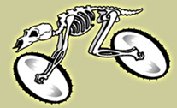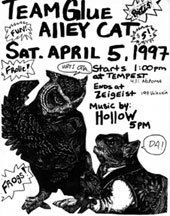

| A History of Bike Messengering in San Francisco
I guess we should start with the first S.F. messenger killed back in 1888. His name was little Johnny Hancock, and he had been employed as a walker for 2 months. It seems that this young orphan had been enjoying himself in the brothels and opium dens of the Barbary Coast, when he leaped off a cable car at Jackson and Kearny and got run over by another cable car. He died two days later, after leg amputation. No blame was attached to the driver. Bicycle messengering officially started in 1894, when a railway strike halted mail delivery for the Bay Area. An ingenious bicycle shop owner in Fresno came up with the idea to deliver it by bicycle. He set up a relay between Fresno and S.F., with 6 riders covering about 30 miles each. The last rider would cover 60 miles. It was a complete success, and our job was set in motion. Between the mail route and the bicycle craze at the turn of the century, companies started to employ bike messengers. Western Union was one of the first, using bikes to deliver telegraphs to anxious clients. Other local businesses started to catch on to the idea that a bike was an extremely efficient way to get products to their customers. In 1945, the first all-bicycle delivery service was founded by Carl Sparks. Sparkie's went on to become Aero, which was bought out in 1998 later absorbed into CitySprint.
In the mid seventies, Punk Rock hit S.F., and messengering allowed people with Mohawks to earn a living. Many semi-famous messenger bands ensued. In 1979, over 10 years before the first CMWC, the Bike Messenger Olympics was held downtown. Several tests of skill are performed, including the pedestrian slalom, the wheelie test, and the briefcase pass. The early eighties bring the "Gravy Days", bike messengers can be loud, rude, and reeking of alcohol, yet still make a decent wage. To celebrate this, "The Farm" is opened up for messenger shows, complete with bands, art, light shows etc. The first "Road Rash Bash" is held to benefit The Farm. In 1984, Gold Mountain Courier is created to help refugees on public assistance hold a job and learn the streets. And then right after the FAX machine is invented, a major earthquake hits S.F., completely messin' with the economy. Clients cut back on deliveries, as well as pay. One speeds with baskets give way to mountain bikes, enabling messengers to get around quicker. Messenger companies start to fold, and the public's opinion of messengers reaches an all-time low. One police officer even proposes to require bike messenger to wear an identification sign on their shirt, visible from no less than 10 feet away. Messenger activism, however, starts to grow and grow. BAAR is created to aid Afghan amputees, Critical Mass gets its start with the help of the SFBMA, the AIDS ride uses bike messengers in a fashion show to promote their ride, the Hanx and the Jak's start gathering toys for needy kids at Christmas time, the Russian River Ride becomes an annual "mecca" for the SFBMA, the Small Messenger Company Picnic unifies the "little fish," and 'zines of every form interest the eyes of many a standby victim.
And here you are now, at the culmination of over 100 years of bicycle messengering in San Francisco. Hopefully the future will bring a decent wage, health benefits, sick pay, equipment compensation, retirement plans; stuff that any other life threatening job offers without question.
And the story continues... (2000) Since 1996 and the CMWC, things have continued to progress - the SFBMA has become a force to be reckoned with, and the community has continued to grow, as has messenger activism.
The late 90's brought a massive consolidation of several midsize companies (Battery Point, Zap, S-Car-Go, Crosstown, Alpha Express, Studebaker) and one of SF's historically dominant companies (Aero) under the umbrella of Dispatch Management Services (DMS), which eventually became what is now CitySprint. Speedway merged with South Bay freight company UltraEx, and took their name. The big players in the SF messenger industry certainly got bigger. The later part of the decade also saw a burst of activity from the independants as well, though. Multiple small companies spun out of disillussioned workers from the large companies, especially the DMS, and have made successes of themselves, using new technologies and approaches that have taken the small messenger company a step forward. Along with this has come a gradual increase in prices, due in no small part to the organizing drive, and the multiple work actions that came with it - Riders at UltraEx, DMS and Professional Messenger have struck multiple times in the past few years, and with varying levels of success. Most recently, the workers at the SF branch of UltraEx have signed the industry's first union contract in over 10 years, guaranteeing them a pay raise, better vacation benefits, and compensation for mileage and equipment, as well as becoming the first SF major company to comply with state overtime law.
Team Proj flyer by America, 1997; Los Cerveceros flyer by Eddy Galvan; Lewd flyer by Tony Calzone, Team Glue flyer by Stephanie, 1997
|
home | events | cognition | constitution | archives | donate | broken bones fund | contact | links
Cognition logo created by Louis Seastres, owned by the SFBMA. Contact webmaster here.
 An
excerpt from the CMWC 96 Information Booklet
An
excerpt from the CMWC 96 Information Booklet When
the sixties came along, so did a new breed of messengers. Instead
of caps and bow-ties, jeans and t-shirts became the uniform. Bike
messengering became the starving artists way of employment, and
the number of companies soon reached over 10.
When
the sixties came along, so did a new breed of messengers. Instead
of caps and bow-ties, jeans and t-shirts became the uniform. Bike
messengering became the starving artists way of employment, and
the number of companies soon reached over 10. In
1993, word of the CMWC gets through the international grapevine,
just as the "Road Rash Bash" gets resurrected in Denver.
L. Sid headlines the CMWC '93 World Welcome Party, while back home,
road bike racers start to infiltrate the workforce. CMWC '94 brings
an even larger S.F. contingent, culminating in London's first Critical
Mass on a memorial ride after the final race. In S.F., many small
companies start to shack up together, in order to compete economically
with larger companies. Taking it one step further, a bunch of independents
share tags in order to compete economically with the small and large
companies, and learn that after some hard work, they can get back
to the gravy days. CMWC '95 gets S.F.'s largest contingent yet,
over 30 people, and their enthusiasm convinces everyone to hold
CMWC '96 in San Francisco. The SFBMA, as well as the local bike
community show their support, and show up for benefit after benefit
for CMWC '96, enabling the planning committee to actually pull it
off.
In
1993, word of the CMWC gets through the international grapevine,
just as the "Road Rash Bash" gets resurrected in Denver.
L. Sid headlines the CMWC '93 World Welcome Party, while back home,
road bike racers start to infiltrate the workforce. CMWC '94 brings
an even larger S.F. contingent, culminating in London's first Critical
Mass on a memorial ride after the final race. In S.F., many small
companies start to shack up together, in order to compete economically
with larger companies. Taking it one step further, a bunch of independents
share tags in order to compete economically with the small and large
companies, and learn that after some hard work, they can get back
to the gravy days. CMWC '95 gets S.F.'s largest contingent yet,
over 30 people, and their enthusiasm convinces everyone to hold
CMWC '96 in San Francisco. The SFBMA, as well as the local bike
community show their support, and show up for benefit after benefit
for CMWC '96, enabling the planning committee to actually pull it
off.
 Most
influentially, the SFBMA signed a working agreement with the International
Longshore and Warehouse Union (ILWU), a union not only with a long
history here in the Bay Area, but a long history of rank-and-file
union activism. This appealled to those of us who first met with
them back in 1998, and let us to the relationship we have now. When
we first affiliated, we pledged to work together to organize the
industry - not just a company here and there, but the whole industry,
for the benefit not only of bikers, but all workers involved in
the messenger industry. Since then, things have come quite a ways
towards the hopes for the future voiced in the last paragraph of
the CMWC '96 booklet quoted above.
Most
influentially, the SFBMA signed a working agreement with the International
Longshore and Warehouse Union (ILWU), a union not only with a long
history here in the Bay Area, but a long history of rank-and-file
union activism. This appealled to those of us who first met with
them back in 1998, and let us to the relationship we have now. When
we first affiliated, we pledged to work together to organize the
industry - not just a company here and there, but the whole industry,
for the benefit not only of bikers, but all workers involved in
the messenger industry. Since then, things have come quite a ways
towards the hopes for the future voiced in the last paragraph of
the CMWC '96 booklet quoted above.